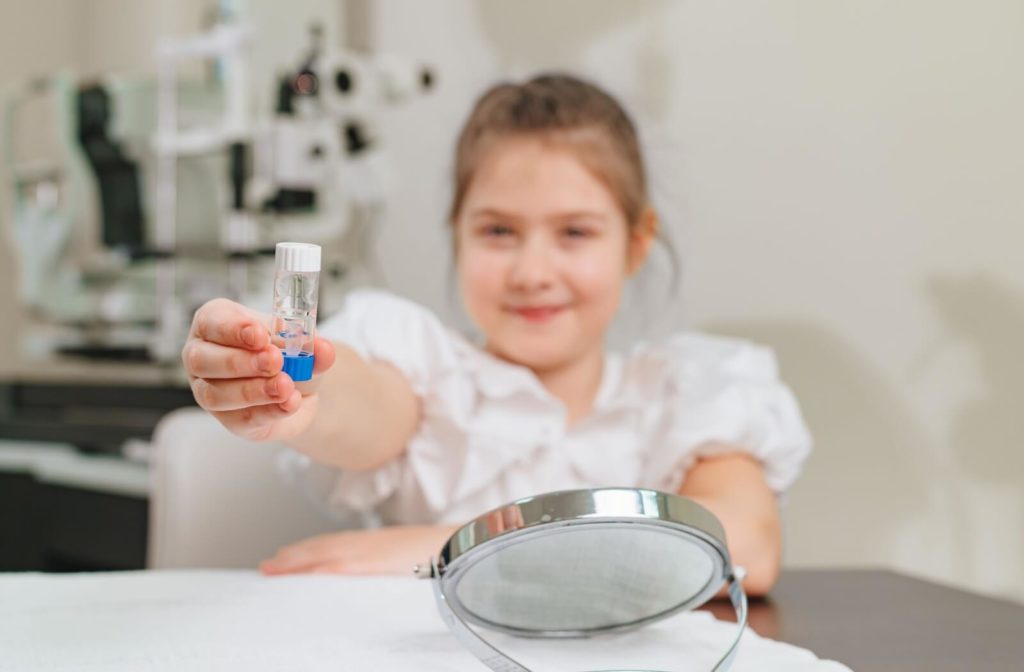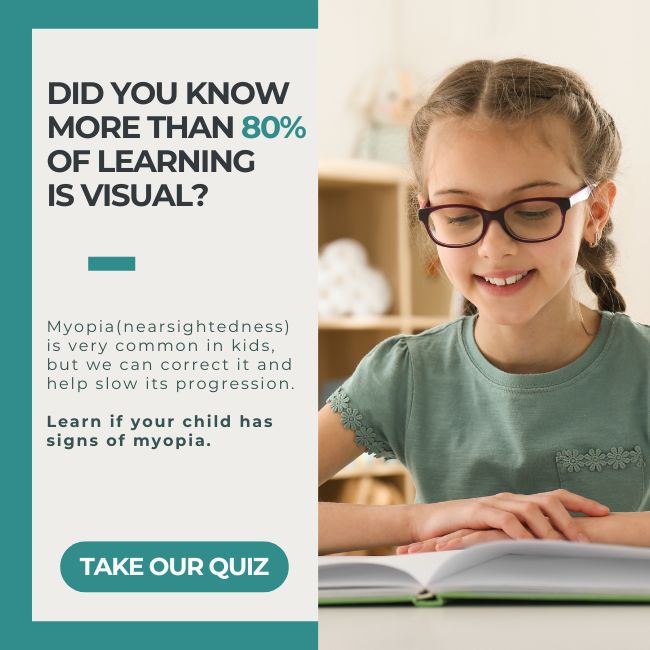One of the most common refractive errors in children’s eyes that causes them to need eyeglasses is myopia (or nearsightedness). This condition affects one’s ability to see distant objects. While there is no way to reverse or cure myopia, the error can be corrected with eyeglasses, contact lenses, or eye surgeries.
There are several management strategies for myopia (especially for children before surgery is a viable option) that can help correct the error and prevent its worsening.
What is Myopia?
Myopia, commonly known as nearsightedness, is a refractive error in which close objects are seen clearly, but distant ones appear blurred. This happens when the eye’s shape causes light rays to bend (refract) incorrectly, focusing images in front of the retina instead of on it.
Many factors, including genetics and environmental influences like prolonged screen time and reading, contribute to its development, which often begins in childhood and can progress with age. Interestingly, myopia is on the rise globally, with estimates suggesting that nearly 50% of the world’s population could be affected by 2050.
Early Intervention Is Key
Early intervention aims to slow down or halt the worsening of nearsightedness, potentially reducing the risk of developing severe myopia-related complications like retinal detachments, myopic maculopathy, glaucoma, and cataracts later in life.
Regular eye examinations are a fundamental step in early intervention. Eye care professionals can monitor vision changes and prescribe corrective measures as needed. These exams provide an opportunity for timely prescription adjustments, ensuring optimal visual comfort.
Managing Myopia in Children
Managing myopia in children requires a tailored approach that considers medical interventions and lifestyle adjustments. Parents can use the right strategies to support their children’s visual health and well-being. Here are some practical ways to manage myopia in children.
- Eyedrops containing low-dose atropine have gained attention for their potential to slow the progression of myopia in children. Atropine works by relaxing the eye’s focusing muscles, reducing strain, and potentially slowing down the advancement of nearsightedness.
- MiSight Contact Lenses: These innovative lenses are designed to slow down the progression of myopia in children by using peripheral defocus technology. The lenses focus light accurately on the retina, providing clear vision while reducing the rate of myopia progression.
- Hoya MiyoSmart Lenses: These specialty lenses for children feature Defocus Incorporated Multiple Segments (DIMS) technology, which corrects vision at the lens center while creating myopic defocus with small segments. Clinically proven to slow myopia progression and eye elongation by an average of 60%.
- Orthokeratology offers a non-surgical solution for managing myopia in children. The cornea is reshaped by wearing specially designed contact lenses overnight, providing clear vision during the day. This approach can be particularly beneficial for active children who dislike wearing glasses.

Additional Myopia Correction Options
While no definitive cure for myopia exists, specific interventions and lifestyle adjustments may offer hope for improving nearsightedness.
Laser eye surgery, such as LASIK or PRK, reshapes the cornea to improve focus, offering patients clearer vision without needing glasses or contact lenses. However, these surgeries are only suitable for some, and careful consultation with an eye surgeon is necessary.
Supporting Visual Health at Home
Promoting good visual health at home is a proactive way to manage myopia and enhance overall eye well-being. Here are some tips to help create an eye-friendly environment:
- Ensure that reading and working spaces are well-lit and free from glare.
- Encourage regular breaks, use blue light filters when possible, and maintain an appropriate distance from screens to reduce eye strain. Limiting screen time is crucial, especially for children. Prolonged use of digital devices can strain the eyes and contribute to myopia progression.
- Encourage children and adults alike to spend time outdoors, engaging in activities that expose them to natural light and visual stimuli. This can help balance the demands on the eyes and reduce the risk of myopia progression.
- Incorporate foods rich in vitamins A, C, and E and omega-3 fatty acids into your diet. These nutrients support eye health and may reduce the risk of vision-related issues.
Navigating Myopia with Confidence
In a world where myopia is becoming increasingly prevalent, equipping yourself with knowledge and resources is essential for effective management.
Regular eye examinations remain a critical component of myopia management. These appointments provide valuable insights into changes in vision and allow for timely adjustments to prescriptions and interventions. By understanding the available options and making informed decisions, individuals and parents can take proactive steps to maintain optimal visual health.
Insight Eyecare is privileged to provide our patients and their families with comprehensive vision and eye health examinations, high-quality products, and our full time and attention. Contact us today to book your next comprehensive eye exam to help manage your or your child’s myopia.







